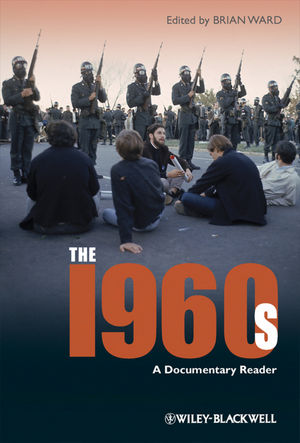|
Textbook
The 1960s: A Documentary ReaderISBN: 978-1-4051-6330-9
Paperback
256 pages
September 2009, ©2010, Wiley-Blackwell
 This is a Print-on-Demand title. It will be printed specifically to fill your order. Please allow an additional 10-15 days delivery time. The book is not returnable.
Other Available Formats: Hardcover
|
||||||
Acknowledgments.
Introduction.
1. Into the 1960s.
1. Jack Gould, Elvis Presley on the Ed Sullivan Show, 1956.
2. Martin Luther King, Jr., “Our Struggle,” 1956.
3. Nora Johnson, “Sex and the College Girl,” 1957.
4. Time, “The Roots of Home,” 1960.
5. Dwight D. Eisenhower, Farewell Address, 1961.
2. The Economy: Abundance, Consumerism, and Poverty.
1. Michael Harrington, The Other America, 1962.
2. Council of Economic Advisers, Annual Report, 1965, 1966.
3. Frigidaire, Advertisement for Gemini 19 Refrigerator, 1966.
4. The Monkees, “Pleasant Valley Sunday,” 1967.
5. Billboard, Top Selling Records, 1960–9.
3. The Cold War Context.
1. John F. Kennedy, Inaugural Address, 1961.
2. Robert McNamara, Notes on October 21, 1962, Meeting with the President, 1962.
3. Stanley Kubrick, Terry Southern, and Peter George, Dr. Strangelove: Or, How I Learned to Stop Worrying and Love the Bomb, 1964.
4. Revd. David A. Noebel, Rhythm, Riots and Revolution, 1966.
4. The Civil Rights Movement.
1. SNCC, Statement of Purpose, 1960.
2. Martin Luther King, Jr., “I Have a Dream,” 1963.
3. Malcolm X, “The Ballot or the Bullet,” 1964.
4. Fannie Lou Hamer, Testimony to the Democratic Party National Convention, 1964.
5. Lyndon B. Johnson, “To Fulfill These Rights,” 1965.
5. The New Left and the Counterculture.
1. Students for a Democratic Society, the Port Huron Statement, 1962.
2. Mario Savio, “An End to History,” 1964.
3. Rick Griffin, Pow-Wow: A Gathering of the Tribes, 1967.
4. Warren Hinckle, “A Social History of the Hippies,” 1967.
5. Yippie!, “People, Get Ready,” 1968.
6. Vietnam.
1. Lyndon B. Johnson, Telephone Conversation with Senator Richard Russell, 1964.
2. US Congress, Tonkin Gulf Resolution, 1964.
3. US State Department, Aggression from the North, 1965.
4. Country Joe and the Fish, “I Feel Like I’m Fixin’-to-Die Rag,” 1965/1967.
5. Corporal Jon Johnson, Letter to Mom & Dad & Peggy, 1966.
6. CBS News, “Saigon Under Fire,” 1968.
7. Gender and Sexuality.
1. Betty Friedan, The Feminine Mystique, 1963.
2. US News & World Report, “The Pill,” 1966.
3. National Organization for Women, Bill of Rights, 1967.
4. Redstockings Manifesto, 1969.
5. Lucian Truscott, IV, “Gay Power Comes to Sheridan Square,” 1969.
6. Ruth Miller, Testimony to Senate Hearing on an Equal Rights Amendment, 1970.
8. Conservatism and the New Right.
1. Billy Graham, “The National Purpose,” 1960.
2. Young Americans for Freedom, Sharon Statement, 1960.
3. US Supreme Court, Abington v. Schempp, 1963.
4. Ronald Reagan, “A Time for Choosing,” 1964.
5. Herblock, “Wallace For President,” 1968.
6. Richard M. Nixon, Presidential Nomination Acceptance Speech, 1968.
7. Spiro Agnew, Television News Coverage , 1969.
9. Science, Technology, and the Environment.
1. John F. Kennedy, “The Nation’s Space Effort,” 1962.
2. Sony, Advertisement for Micro-TV, 1962.
3. Rachel Carson, Silent Spring, 1962.
4. US Congress, the Wilderness Act, 1964.
5. Stewart Brand, Whole Earth Catalog, 1968.
10. Racial and Ethnic Identity: Pride and Politics.
1. Black Panther Party, “What We Want, What We Believe,” 1966.
2. Associated Press, Black Power Salute at the Mexico Olympics, 1968.
3. Indians of All Nations, “Alcatraz Proclamation,” 1969.
4. Chicano National Conference, “El Plan de Aztlán,” 1969.
11. Out of the 1960s: Alternative Endings.
1. Robert F. Kennedy, Remarks on the Death of Martin Luther King, 1968.
2. Joni Mitchell, “Woodstock,” 1969.
3. John Filo, Kent State Killings, 1970.
4. US Supreme Court, Roe v. Wade, 1973.
5. Watergate Special Prosecution Force, Memo on Prosecuting Richard M. Nixon, 1974.
12. The 1960s in Myth and Memory.
1. Dan Quayle, “Reflections on Urban America,” 1992.
2. Stephen Holden, “Seeing the 60s Through a 90s Corrective Lens,” 1999.
3. David Greenberg, “Saigon and Saddam: The Use and Abuse of Vietnam Analogies,” 2004.
4. Thomas J. Sugrue, “The End of the ’60s,” 2008.
Further Reading.
Index.



